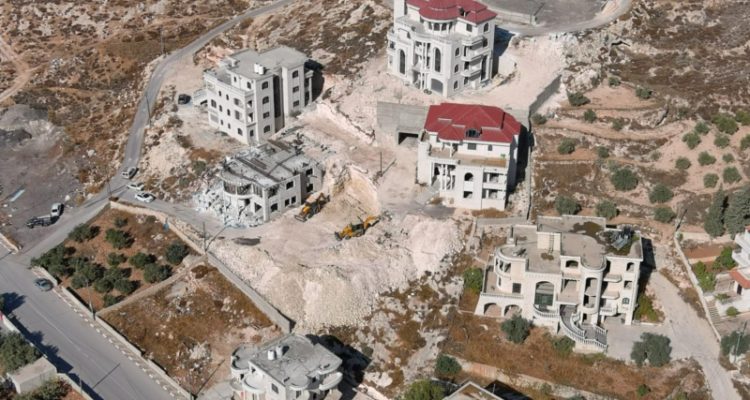The European Union’s drive to help the Palestinian Authority take over Area C is “a violation of international law and treaty,” says Naomi Kahn of the Regavim NGO.
By David Isaac, JNS
A recently leaked European Union document outlining EU strategy to help extend Palestinian control over Area C of Judea and Samaria reveals “a gross violation of Israel’s sovereignty and jurisdiction by purported allies,” Naomi Kahn, director of the International Division for Regavim, an Israeli NGO that deals with land issues, told JNS.
Under the Oslo Accords, Area C, covering 60% of Judea and Samaria, commonly known as the West Bank, falls fully under Israeli authority.
The document, which came to light last week, for the first time reveals that official EU policy is to help the Palestinian Authority take over Area C, Kahn said. The document declares the ultimate objective is to integrate Area C with Areas A and B, which fall under Palestinian control.
“The goal of the Europeans is to encourage Palestinians to register land in Area C; land under someone else’s legal jurisdiction. It’s a violation of international law and treaty,” Kahn said. “The government of Israel has to make it clear to the European Union that foreign intervention that is changing the map and undermining its ability to negotiate a resolution will no longer be accepted.”
Forty Knesset members sent a strongly worded protest to EU leaders saying it constituted a “grave breach” of the Israel-EU relationship. A Knesset committee will hold a special hearing on the issue.
The EU document, dating from June and obtained by JNS, was composed by the EU’s mission in eastern Jerusalem and is marked “confidential—not for circulation.” It outlines a plan for “defending the rights of Palestinians living in Area C and preserving Area C as part of a future Palestinian State, in line with the Oslo Accords.”
The document focuses on the EU’s plan to strengthen the PA’s illegal holdings in Area C and suggests various improvements— a “strategic evolution”—to that plan. The document said the current plan rests on four pillars: 1) Planning and mapping; 2) Social and public infrastructure projects; 3) Private sector development, particularly in agriculture and green energy; and 4) Local governance.
“It’s essentially proof of what we’ve been seeing on the ground,” Kahn said. “Mapping, first of all, is an act that expresses some sort of sovereignty. If something is registered, that is legally binding and can be acted upon. It accrues rights and responsibilities.”
The PA, which employs 600 people in its land registry department, doesn’t hesitate to register Israeli territory.
“Palestinians have shown up in Israeli courts when there’s a dispute over land, and said, ‘It’s registered to my name, or it’s registered in the State of Palestine.’ The [Israeli] Supreme Court hasn’t yet accepted these land registrations, but neither has it thrown them out,” Kahn said.
In 1967, Israel suspended land registration in Judea and Samaria. “We’ve created a vacuum and we’re allowing the other side to fill the vacuum,” she said.
Emmanuel Navon, a senior fellow at the Jerusalem Institute for Security Studies (JISS), agreed that Israel shares responsibility for the situation.
“It’s easy to always blame others, but we have to also look at ourselves,” he said. “Israel never made a decision, neither governments from the right nor the left. What is Israel’s endgame on Area C? Does it intend to turn it into a part of a Palestinian state in the framework of negotiations, or to annex it? Nobody knows because no Israeli government has ever made an official statement on it.”
Navon didn’t find the report surprising. “The EU has always helped fund construction projects for the PA in Area C. The official EU stance is that all of Area C should become part of a Palestinian state.”
For Kahn, one element of the report that did surprise her was its call to keep tabs on Israeli archaeology in Area C. The EU document calls for monitoring archaeological research because it says Israel politicizes archaeology to thwart Palestinian expansion.
Kahn said what’s actually happening is that the PA has destroyed “countless archaeological sites” in Judea and Samaria with the goal of erasing Jewish ties to the land. They use several methods, either destroying them, plowing them under, or redefining them as “Palestinian,” she said.
The 40 Israeli lawmakers who signed the open letter to EU leaders underscored the archaeological issue:
“Especially jarring was your call to monitor the archaeological activities of the State of Israel at Jewish heritage sites. This singular call has but one goal: to subvert the deep and indestructible bond between the Jewish people and its country and homeland—its bond to the Hasmonean palaces and…to Joshua’s altar on Mount Ebal, to our first capital in Shilo and to the tombs of our ancestors, our forefathers and foremothers, in the Cave of the Patriarchs and on the road to Bethlehem.”
It’s not yet known how the revelation will impact Israel-EU relations. Navon said it won’t affect E.U. thinking.
“The position of the U.S. government on Area C is no different than that of the EU. U.S. aid also goes to funding Palestinian projects. It’s just easier and more popular to write a letter to the EU than to the U.S. government,” he said.
“What Israel needs to do is to decide what its policy is,” Navon said.





